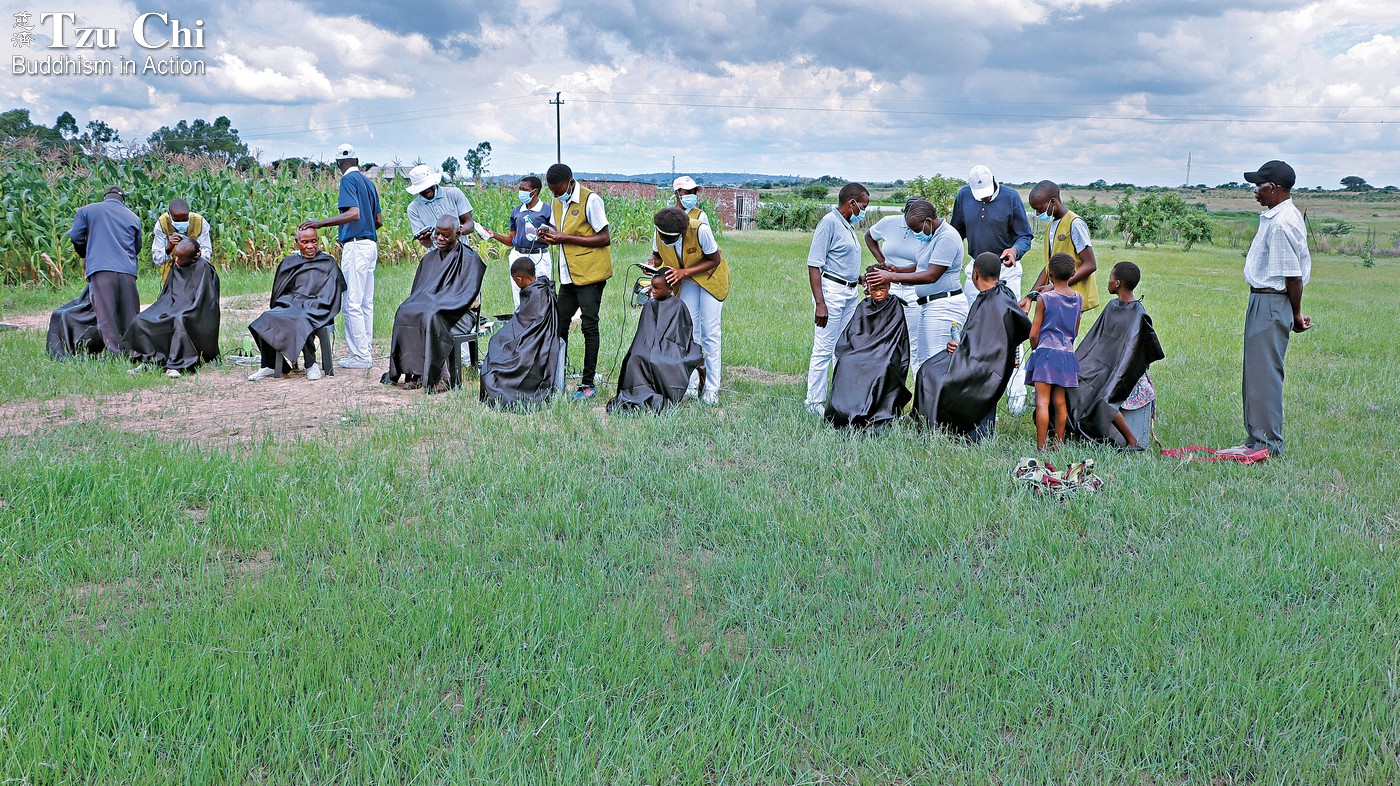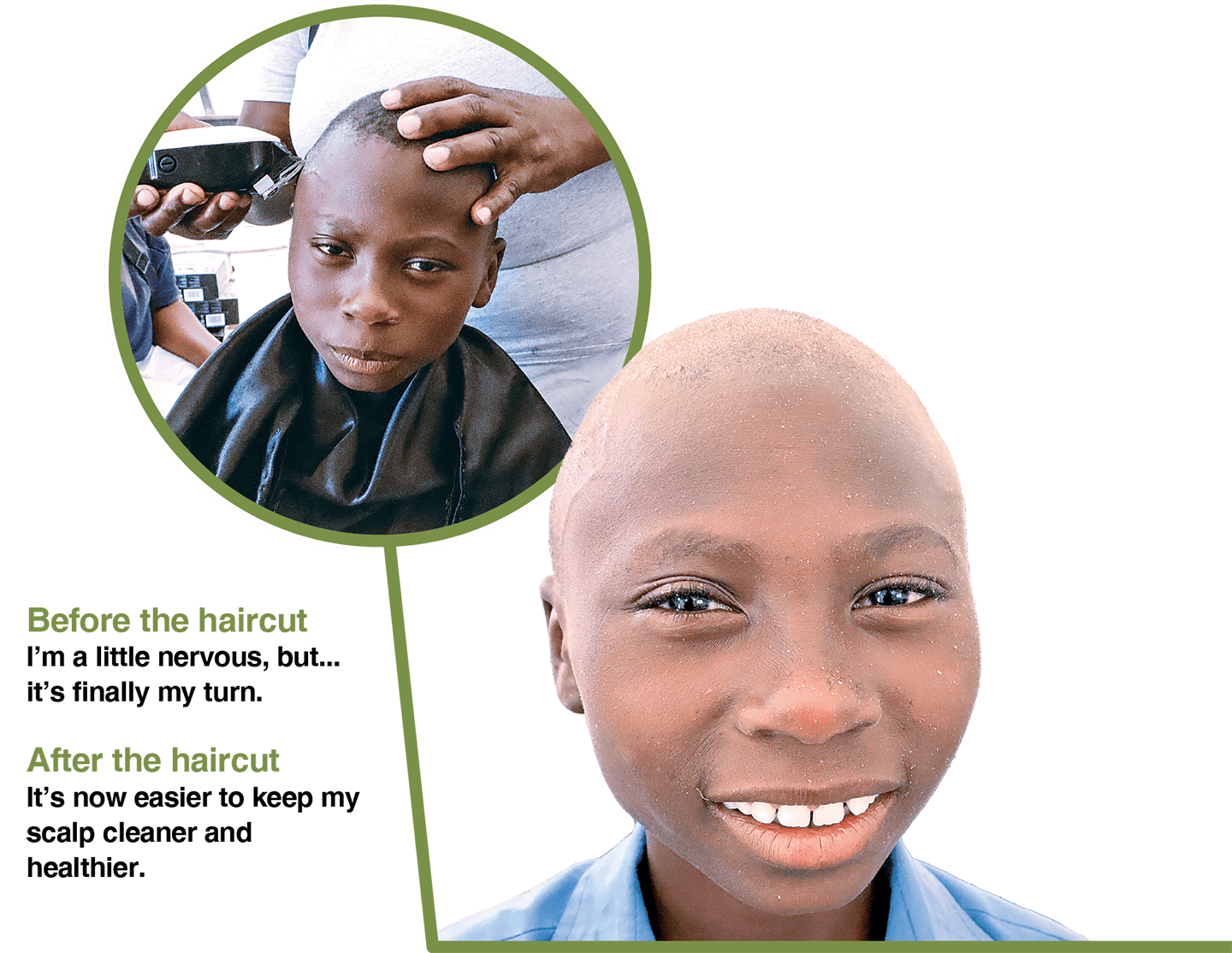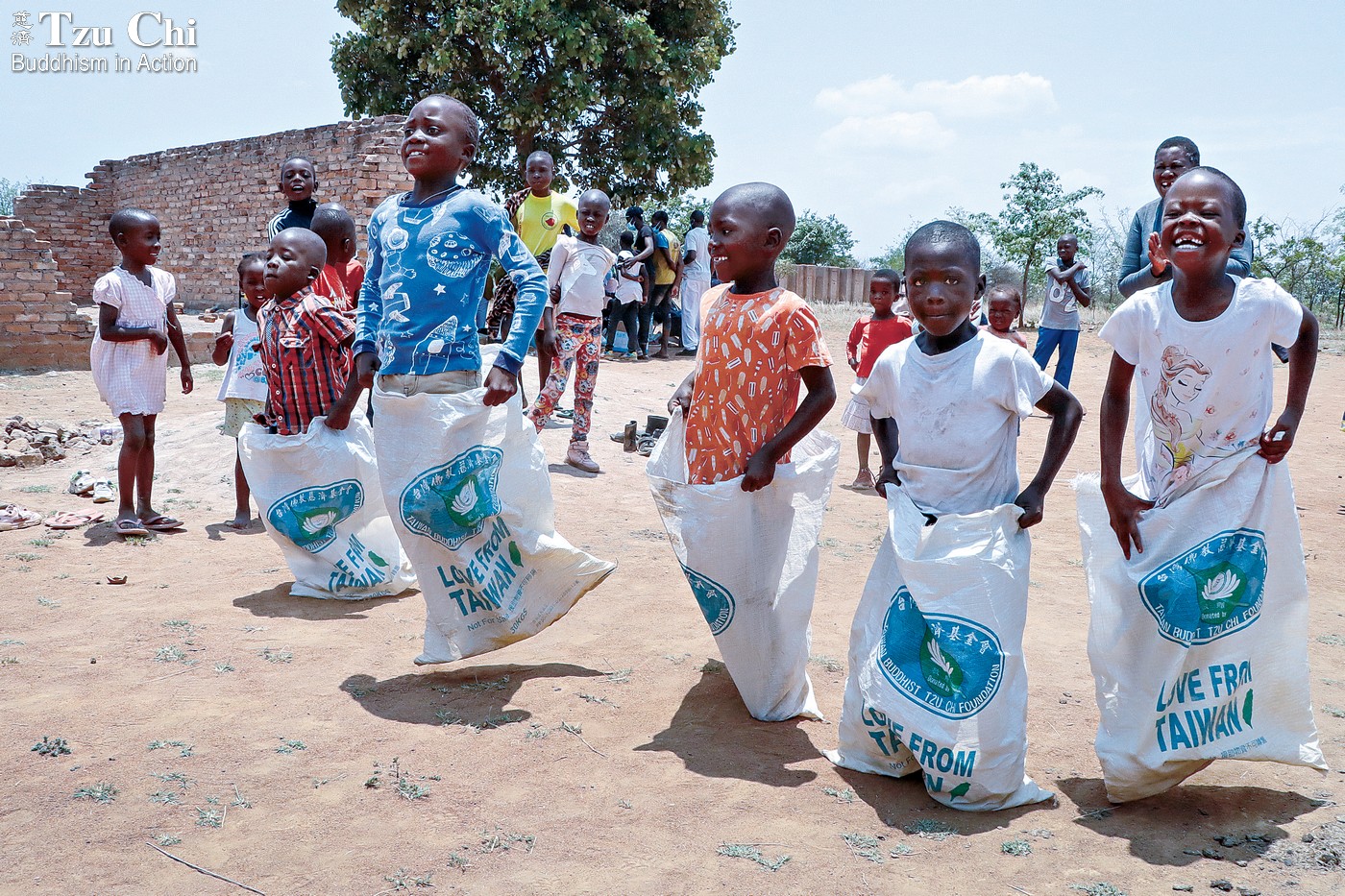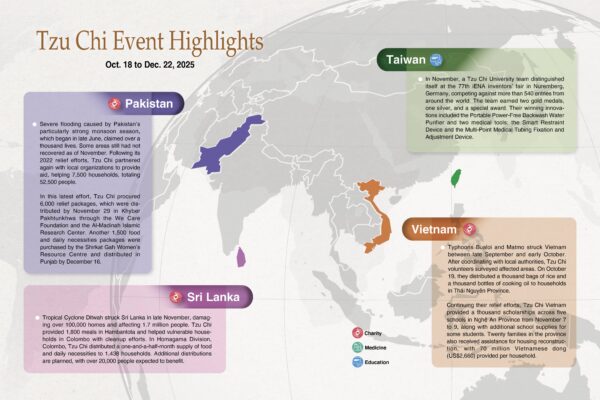By Zhu Xiu-lian, Tino Chu, Hlengisile Jiyane, and Lin Jing-ni
Translated by Wu Hsiao-ting
Photos by Hlengisile Jiyane
Without money for haircuts or water for washing their hair, rural children in Zimbabwe are commonly infected with scalp ringworm. Tzu Chi volunteers tackle this problem by offering free haircuts and treatments.

Tzu Chi volunteers provide free haircuts for children and community residents in Domboshava, Mashonaland East Province, Zimbabwe.
Courtesy of Tino Chu
Can you imagine the magnitude of a number that starts with “1,” followed by 14 zeros? The number is one hundred trillion. Zimbabwe, a landlocked African nation, once actually issued such a banknote in that denomination. Astonishingly, even that astronomical amount was enough to buy only half a loaf of bread.
Zimbabwe achieved independence in 1980. Despite being endowed with an abundance of natural resources, including gold, silver, and nickel, the country has been plagued by prolonged political and fiscal instability. Over a decade ago, it experienced severe hyperinflation, leading to a rapid devaluation of the Zimbabwean currency. It got so bad that a one-hundred-trillion-dollar note could only be exchanged for three eggs. The country’s currency situation has shown some stability in recent years, following efforts by the government to address this issue. However, the COVID-19 pandemic has caused a resurgence of inflation, creating financial challenges even for those with employment.
The country also lacks basic infrastructure when it comes to water. During the dry season, when rainfall is scarce for an extended period, people are left with no alternative but to settle for a simple wipe-down. Under the circumstances, washing one’s hair is regarded as a luxury. Moreover, haircuts, which can range from one to five U.S. dollars, carry a price tag comparable to a meal. If impoverished families have this amount of money, their priority lies in filling their stomachs, not taking care of their hair.
With no money for haircuts and no water for washing their hair, many children suffer from scalp ringworm, a highly contagious fungal infection of the scalp. To make matters worse, many parents are unable to afford the required medication, leaving their children with no chance of a cure. Taiwanese businessman Tino Chu (朱金財) became aware of this problem when he visited schools to provide food for free. He pondered how to help solve it.

Punished for wearing his hair too long
Originally from Taiwan, Chu relocated from South Africa to Zimbabwe in 1995, where he established a garment factory and 12 stores offering clothing and miscellaneous goods. Things went relatively well until his businesses were robbed four times by mobs, resulting in substantial losses that pushed him to the brink of desperation. However, his life took a transformative turn when something he read in a Buddhist scripture inspired him to do good and give to the needy. This marked the beginning of his charitable endeavors in Zimbabwe, reshaping his path and purpose in life.
Facing the prevalence of scalp ringworm in the country, he contemplated: “Why not offer free haircuts to shave their hair and reduce the chance of dirt and grime accumulating on the scalp?” Putting his idea into action, he recruited a team of volunteer barbers to assist him in his mission. After procuring electric hair clippers, a power generator, and even crafting barber capes himself, he and the volunteer barbers ventured into schools and villages, providing haircuts and administering medicated solutions to treat the condition.
Chu returned to Taiwan in 2011 to receive his Tzu Chi volunteer certification. After that, he continued to offer free haircuts in Zimbabwe. Over the course of more than a decade, he and his team have visited numerous schools, gaining consent from principals one by one, and cutting the hair of hundreds of students on each occasion. This project was going strong until 2020, when the sudden outbreak of COVID-19 and the subsequent enforcement of lockdown measures forced them to temporarily suspend their services.
“I returned to Taiwan in August 2022,” Chu recalled. “During my stay, Master Cheng Yen once again mentioned our haircut services in Zimbabwe.” He was moved by the fact that the Master had such a clear recollection of their work. After his return to Zimbabwe, he came across a piece of news that said that in Mhondoro, Mashonaland West Province, a ten-year-old boy named Tanya had been subjected to corporal punishment by his teacher for wearing his hair too long. The teacher struck each of the boy’s palms ten times as a form of punishment. Unfortunately, the boy was particularly weak that day due to going to school on an empty stomach, causing him to faint after the punishment. He had to be sent to the hospital to recover.
Chu’s heart went out to the boy. The pandemic situation had significantly improved by then, so he and other volunteers wasted no time in resuming their haircutting and food supply services. From the capital city of Harare to nearby provinces, they provided a total of 10,900 haircuts within just six months, commencing in October 2022.
At Nyamande Primary School in Domboshava, Mashonaland East Province, a group of children lined up and walked across the sandy ground, gathering under a cluster of trees while awaiting their turn to receive haircuts. A row of chairs had been set up, while a power generator hummed loudly in the background. Volunteers quickly set to work under the meager shade provided by the trees, using electric hair clippers to provide haircuts to the students. There were a lot of children waiting, keeping the volunteers on their feet for hours without rest. November to April is the summer season in Zimbabwe, with occasional rainfall, so volunteers kept an eye out for deteriorating weather conditions as they worked. Chu oversaw every aspect to ensure everything was in order.
When Chu and his fellow volunteers visited the Mhondoro area to offer haircuts, he made a special visit to the boy Tanya and his mother. Taking the boy’s small hand, he expressed his heartfelt empathy, saying, “I can imagine the pain the child endured from the strokes on his palms.” The volunteers who accompanied Chu presented the mother and son with some daily supplies. Tanya’s face brightened with a smile.
The mother said, “Our family is struggling to afford even meals, so how could we possibly have money to spare for our child’s haircuts?” She thanked Tzu Chi for solving two problems for them at the same time. “Our boy’s hair was cut, and he won’t go hungry [with the food you provided]. He’ll be better able to focus in school now.”

Children in Mhondoro, Mashonaland West Province, participate in a game arranged by Tzu Chi volunteers before a haircutting event.
Hair clippers buzzing
In Zimbabwe, government regulations restrict gatherings, so each haircutting session requires permission from the relevant authorities. Volunteers arrive at each session fully equipped, even bringing chairs along in their vehicles. Prior to the haircuts, they engage the children in games using empty rice bags. For the participating children, who typically spend their days with their grandparents, this time together brings them treasured moments of happiness.
On March 9, volunteers arrived at Miriro Children Care Network Primary School in Harare to provide free haircuts. However, they encountered a problem with the power generator that day—it couldn’t supply enough power for all ten hair clippers simultaneously. The haircutting process slowed down with only a few clippers in operation. Students from a nearby secondary school noticed the large number of children waiting for haircuts and came forward to offer their assistance.
Volunteers shaved away the children’s tangled curls, one student after another. Over 90 percent of the children were infected with scalp ringworm. “Before the haircut, they looked fine. But we noticed the problem after the haircut,” explained Chu. Children with scalp ringworm feel self-conscious, he added. However, after the medicated solution was sprayed on, their scalp improved within half an hour, and their previously furrowed brow transformed into a smile.
The volunteers’ haircutting services made a significant impact. In less than a month, they were receiving invitations from village chiefs and community members to return and provide more haircuts. At Nyamande Elementary School, so many students received haircuts that volunteers had to occasionally pause their work to prevent the generator from overheating. Despite the delays, they worked with focus, without any complaints. The volunteers were happy, witnessing the children’s dignified appearance and happier demeanor after their haircuts. At the end of the day, everyone worked together to clean up. A sense of joy permeated the air.
Chu was once diagnosed with COVID-19. His condition was so severe he needed to be put on a ventilator. Knowing how much he cared for the needy in Zimbabwe, his wife wisely encouraged him to strive for recovery for the sake of those who needed his help. Driven by the hardships faced by the people in the country, Chu fought hard to overcome the illness and succeeded. Following his recovery and discharge from the hospital, he continued to lead local volunteers in distributing aid, drilling wells, providing haircuts, and other work. Reflecting on his experience with COVID, he said, “Having gone through this ordeal, I expect myself to make the most of every second to help those in need.”
He remains steadfast in his mission, unwaveringly dedicated to making a difference in the lives of local impoverished people and bringing smiles to more and more children.



